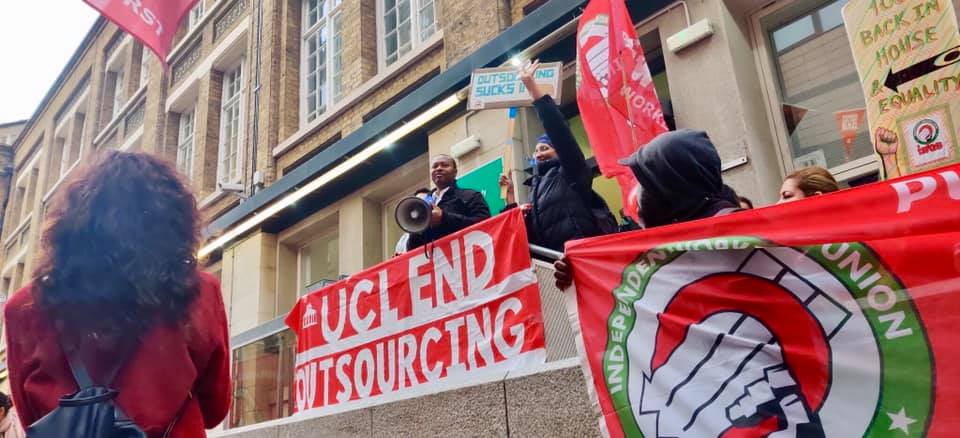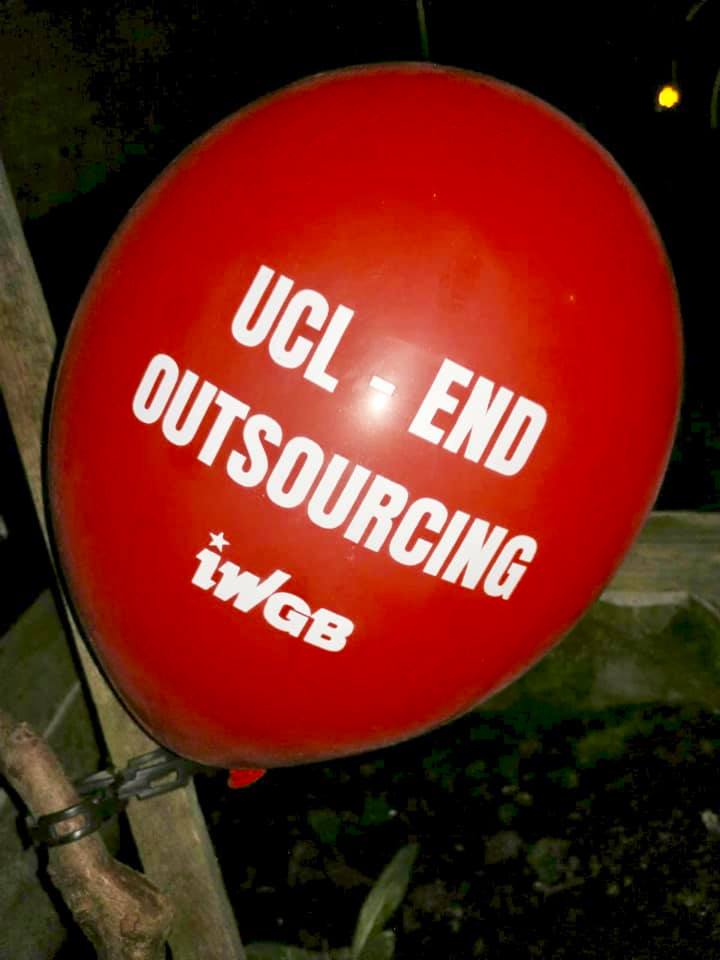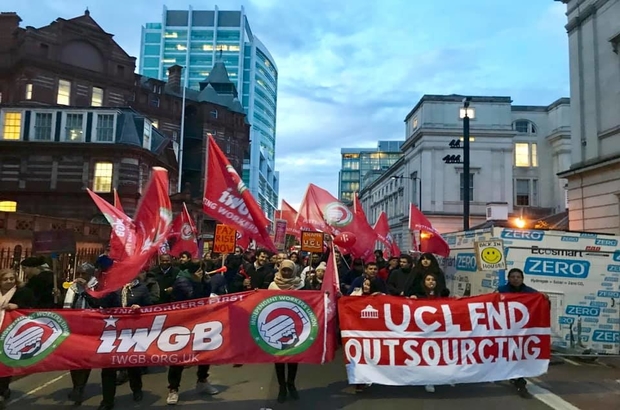Carolina Abbott Galvão covers the Justice for UCL Workers campaign
At 8 AM on a Friday, Malet Place is cold, uncharacteristically empty and quiet. This is when Maritza Castillo-Calle walks into campus and begins setting up a coffee stall. With the tactful ease of someone who has done this many times before, she puts up a table and lays an assortment of pastries, hot beverages and paper on its surface. In a matter of seconds, a crowd forms around her, filling the space with warm chatter, easy conversation and laughter.
There are almost no students here – it’s too early for that. But the cleaners, porters, and night security staff have been at UCL since early in the morning. This is who Maritza and her colleagues at the Independent Workers’ Union of Great Britain (IWGB) are mostly interested in talking to. For the past two years, the IWGB have been building up their presence on campus by listening to workers, encouraging them to come together and fighting for their rights. In many ways, this strategy, propelled by the IWGB’s grassroots approach to recruitment, has been largely effective. At UCL, the union now has a membership of over 300 outsourced workers, including the vast majority of security officers and hundreds of cleaners and porters. Only two years ago, that figure was zero.
Alipio dos Santos is a member of the IWGB, and has worked as a cleaner at UCL since 2008. Having moved here in 2007, he tells me he likes London well enough. In fact, he doesn’t even mind the rain – it reminds him of the weather in his hometown, São Paulo. With that said, Alipio has never had much free time in the city. Every day, he wakes up when it is still dark out to arrive at UCL at 3:45 in the morning, where he stays until 5 PM. As we attempt to find a quiet place to sit and chat during his break, he takes me through a series of hallways and doors and notes, “I know everything in here”.
For over a decade, Alipio has worked to keep the university clean for the students that go here. “It’s hard work,” he sighs, “but it’s often rewarding to see the place tidy after a long day”. Still, although Alipio and his colleagues certainly know the value of the work they do, to many students and to much of the staff at UCL, they are invisible. “People don’t respect us in here,” he adds.

Stories like his are not uncommon on campus, where outsourced support staff are often treated like second-class citizens. At UCL, cleaners, porters, security and catering staff employed by third-parties like Sodexo and Axis have far worse conditions than directly employed staff, including worse pay, pensions and holiday entitlements and little or no parental leave and sick pay.
While direct employees can get up to 26 weeks of full pay when they are off sick, outsourced workers are on the statutory minimum. This means that for the first three days they are off sick, workers employed by Sodexo and Axis do not get paid at all, and after this they receive a pittance. This often forces them to come into work when they are unwell. In addition, outsourced workers are more likely to suffer from bullying and discrimination than their in-house colleagues. Many report being picked on by their bosses for arbitrary reasons, being forced to move locations or exclusively clean toilets as a punishment for complaining about workplace abuses.
For the vast majority of outsourced workers, many of whom are migrants, putting up with these conditions is not a choice but a necessity. Indeed, for Alipio, the perpetuation of inequalities between in-house staff and outsourced workers has been set in place to take advantage of migrants like him, who often find themselves in vulnerable conditions. Of this he says, “When I first came here I signed a contract without even knowing what was written on it. I didn’t speak a word of English…but I had no choice, I had a family to look after”. For UCL, on the other hand, outsourcing is a way for management to rid themselves of any responsibility when it comes to workplace abuse and working conditions. Employing workers through third parties like Sodexo and Axis enables the university to remove their legal responsibility from day to day issues.

On 16th September, following two years of preparation and the success of similar campaigns at LSE, SOAS, Goldsmiths and the University of London’s Central Administration at Senate House, IWGB members at UCL voted to launch a campaign here too. They wrote to UCL’s Provost Michael Arthur and the UCL Council, and gave them a deadline of three weeks to commit to ending outsourcing, inequality and zero-hour contracts, or face the possibility of strike action. Three weeks later, after UCL rejected the offer and opportunity to negotiate, the IWGB officially launched a campaign to end outsourcing at the university. The union is currently in the process of formally balloting cleaners, porters, and security officers for strike action with results due to come in on 5th November.
So far, UCL has not made any official comment on the IWGB’s campaign or about the threat of strike action. Instead, they have been carrying out negotiations with UNISON, who have been running a similar campaign at the university for several years. This is an interesting decision not only because the IWGB represent a significantly larger section of the outsourced workforce on campus, but also because the two unions are in fact very different from one another. UNISON is one of the biggest national unions in the UK and much less willing to cause disruption. Though both unions ultimately have similar aims, they have different strategic approaches: UNISON focuses mainly on winning recognition agreements and developing closer relationships with management, while IWGB focuses on building strength and applying firm pressure to management through strikes and direct action. UNISON has also typically focused on representing higher pay grade administrative and professional services staff and has a history of failing to support and resource campaigns by lower-grade migrant workers, excluding them from decision-making processes, and taking credit for campaign victories where it is not due. In fact, in 2014, when the landmark 3 Cosas Campaign was being fought at Senate House, the entirety of UNISON’s outsourced membership left the union to form the University of London branch of the IWGB.

Overall, the fight for outsourced workers’ rights at universities has largely been carried out by migrant workers, mostly because the majority of outsourced workers are migrants themselves. In many ways, the IWGB’s model of bottom-up grassroots organising, which is more attentive to the demands of non-English speaking migrant workers, has proven to be more successful than UNISON’s. In a context where gig-economy work has become increasingly entrenched in everyday life, and where migrant workers bear the brunt of increasingly exploitative labour practices, this model has also become a necessity.
Last week, following the IWGB’s campaign launch and their threat of imminent strike action, UCL announced negotiations with UNISON and subsequently released a statement expressing their commitment to ensuring that outsourced “security, cleaning and catering staff will receive the same or equivalent pay and benefits as directly employed staff”. As a first step, they noted that they are prepared to “offer staff the same holiday entitlements as UCL’s directly employed staff from 1st December this year” and expressed a desire to “achieve parity on other employment benefits” like pay scales, sick pay, maternity and paternity payments and carers’ pay by August 2021, subject to further negotiations with UNISON.
Although UCL’s press release is undoubtedly a mark of progress, many workers are reluctant to declare victory just yet. In a statement released on 23rd October, the IWGB notes that the university’s announcement “gives no serious guarantees” and “no clear timetable for delivery”, recalling that when UCL committed to introducing the London Living Wage within a year in 2010, it ended up taking them five. In addition, UCL’s announcement does not mention in-housing – the central demand raised by outsourced workers. They argue that for the one of the richest universities in the world to deliver a basic level of decent rights for its workforce, 22 months is far too long; it seems like an attempt to delay the process until the workers’ willingness to fight for change dissipates.
For outsourced workers at UCL, the demand to be brought back in house is a question of justice and equality. If individuals who work in the same buildings have access to a number of benefits, why shouldn’t they have them too? For years, the possibility of justice seemed distant and unlikely. But according to Alipio, something seems different now, and he is more hopeful. Of his colleagues, he says “people have more courage nowadays … they used to be afraid to speak out and lose their jobs, but I get the sense they have opened their eyes now. They are more aware of their rights”.
Last week, hundreds of UCL students and staff came out to support outsourced cleaners, porters, and security officers in their campaign to end outsourcing. At the protest, whilst surrounded by workers and students alike, listening to conversations about how to best move forward, I got the sense that something was changing too. Like Alipio, I am hopeful.

If you would like to get involved, follow the IWGB’s social media channels on Twitter and Facebook, check out the student campaign in support of an End to Outsourcing at UCL and sign and share this petition.





